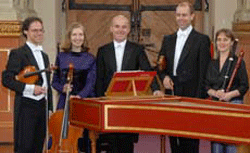Luckily, there was an alternative to the
sweltering pavements and swirling crowds of Freshers Week: the inaugural
Cambridge Handel Festival announced its arrival on the period music scene with
a weekend of the coolest venues and the most exciting music-making. There is
already a well-established Handel “hard core” living in and around
the city — the Cambridge Handel Opera Group is well regarded — but
it was something of an act of faith on the part of the organisers (Cambridge
Early Music) to devote an entire weekend to all things Handelian. It was only
towards the end of the two days, after a scintillating final concert of the
Violin Sonatas by Adrian Butterfield, that it became obvious that the Festival
had not only been an artistic success but had also, most importantly, just
about broken-even financially. In this age of straitened budgets, this is no
mean feat.
 London Handel Players [Photo courtesy of NCEM]
London Handel Players [Photo courtesy of NCEM]
The Festival was an innovative mix of events: a guided walk, talks by Handel
experts, specific church services with a Handelian slant, an organ recital by
the hugely talented Mark Williams in the chastely-elegant confines of
Wren’s Pembroke College Chapel, and both instrumental and vocal concerts
which delighted both enthusiasts and casual ticket-buyers alike. The backbone
of the Festival was, one would have to say, Laurence Cummings and his London
Handel Players who featured not only the deeply satisfying playing of both
Adrian Butterfield (violin) and Rachel Brown (flute/recorder) but also
accompanied the evergreen Emma Kirkby with great finesse and sympathetic
musicianship. This latter concert highlighted arias written for soprano Cecilia
Young (later Mrs Arne) by her husband, Lampe and Handel himself and we were
treated to some songs rarely heard before: “Pretty Warblers” and
“By the rushy-fringed bank” were delightful curiosities,
delightfully sung.
Speaking with various other visitors to this Festival it was obvious that
the variety of events had been a success, as had been the many interesting and
unusual venues. There was a well-produced and informative programme book which
both enlightened the newcomer but also informed the confirmed Handelian —
for instance, the Fitzwilliam Museum in the heart of the city keeps some
manuscript music by the great man which was put on show (with explanatory
notes) especially to coincide with the weekend’s events. One can only
hope that this most lovely of cities will once again feature the works of
Handel and his contemporaries in another such festival: the foundations have
certainly been well-laid.
Sue Loder
image=http://www.operatoday.com/Dame-Emma-Kirkby.gif
image_description=Dame Emma Kirkby [Photo courtesy of London Handel Festival]
product=yes
product_title=The Inaugural Cambridge Handel Festival: a rosy dawn?
product_by=By Sue Loder
product_id=Above: Dame Emma Kirkby [Photo courtesy of London Handel Festival]
The Inaugural Cambridge Handel Festival: a rosy dawn?
Luckily, there was an alternative to the
sweltering pavements and swirling crowds of Freshers Week: the inaugural
Cambridge Handel Festival announced its arrival on the period music scene with
a weekend of the coolest venues and the most exciting music-making. There is
already a well-established Handel “hard core” living in and around
the city — the Cambridge Handel Opera Group is well regarded — but
it was something of an act of faith on the part of the organisers (Cambridge
Early Music) to devote an entire weekend to all things Handelian. It was only
towards the end of the two days, after a scintillating final concert of the
Violin Sonatas by Adrian Butterfield, that it became obvious that the Festival
had not only been an artistic success but had also, most importantly, just
about broken-even financially. In this age of straitened budgets, this is no
mean feat.
The Festival was an innovative mix of events: a guided walk, talks by Handel
experts, specific church services with a Handelian slant, an organ recital by
the hugely talented Mark Williams in the chastely-elegant confines of
Wren’s Pembroke College Chapel, and both instrumental and vocal concerts
which delighted both enthusiasts and casual ticket-buyers alike. The backbone
of the Festival was, one would have to say, Laurence Cummings and his London
Handel Players who featured not only the deeply satisfying playing of both
Adrian Butterfield (violin) and Rachel Brown (flute/recorder) but also
accompanied the evergreen Emma Kirkby with great finesse and sympathetic
musicianship. This latter concert highlighted arias written for soprano Cecilia
Young (later Mrs Arne) by her husband, Lampe and Handel himself and we were
treated to some songs rarely heard before: “Pretty Warblers” and
“By the rushy-fringed bank” were delightful curiosities,
delightfully sung.
Speaking with various other visitors to this Festival it was obvious that
the variety of events had been a success, as had been the many interesting and
unusual venues. There was a well-produced and informative programme book which
both enlightened the newcomer but also informed the confirmed Handelian —
for instance, the Fitzwilliam Museum in the heart of the city keeps some
manuscript music by the great man which was put on show (with explanatory
notes) especially to coincide with the weekend’s events. One can only
hope that this most lovely of cities will once again feature the works of
Handel and his contemporaries in another such festival: the foundations have
certainly been well-laid.
Sue Loder
image=http://www.operatoday.com/Dame-Emma-Kirkby.gif
image_description=Dame Emma Kirkby [Photo courtesy of London Handel Festival]
product=yes
product_title=The Inaugural Cambridge Handel Festival: a rosy dawn?
product_by=By Sue Loder
product_id=Above: Dame Emma Kirkby [Photo courtesy of London Handel Festival]